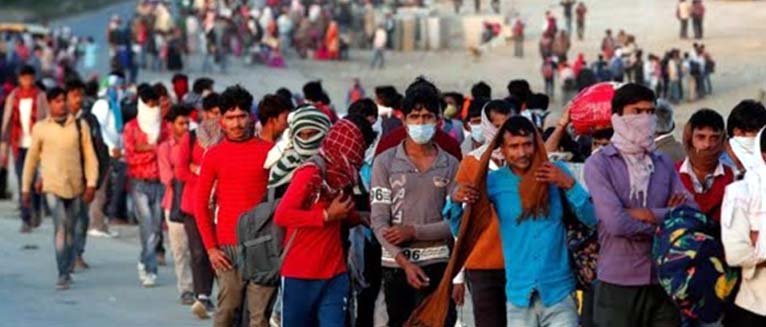Migration is one of the defining issues of 21st century. Migration is caused by various factors like social, political, cultural etc. From a compendium India as of 2019 has, 17.5 million people of Indian origin are residing in other countries as immigrants.
By Khanday Sadaf-un-Nisa:
Migration is one of the defining issues of 21st century. Migration is caused by various factors like social, political, cultural etc. From a compendium India as of 2019 has, 17.5 million people of Indian origin are residing in other countries as immigrants. As the pandemic break out, workers faced lot of acrid situations. Amid this pandemic lockdown was imposed everywhere as a result of which factories and workplaces were shut down. This had a direct impact on migrant workers because they need to face problems like loss of jobs and income, food shortage and they became uncertain about their future. These workers were left with no option than to move back to their home countries. Now all eyes are on state and central government to help them to come out of this state of vagrancy and treat them as an asset to boost the economy and satiate them fully.
As per the skill mapping done by Uttar Pradesh government, so far around 23- 24 lakh migrant workers have returned to Uttar Pradesh during this lockdown. As per the survey done following information was collected:
PAINTERS = 26041
CARPENTERS = 16064
DRIVERS = 9052
ELECTRICIANS = 4980
SECURITY GUARDS = 3364
FURNITURE AND FITTING WORKERS = 2234
Economic times recently released a report that government is going to chart plan to map million migrant workers as per their skills in states including Bihar, Rajasthan, Madhya Pradesh and Jharkhand. By this move of government workers earn livelihood and may provide industries the much needed workforce to kick start full production. This move of government realized the fact that migrant workers when deployed in respected fields will help the workers to acclimate themselves and help India to create workforce in Plethora.
Lock down has left about 42% with no ration and 33% were stuck in cities with no food. Though the working group on migration (2017) set up by the union Ministry of urban housing poverty alleviation has examined the plight of the migrant workers and submitted its report to union government in 2017, no action has been taken on report and seems to be a complete fiasco. Pandemic has paved the way to look forward to improve the condition of workers and abate their sufferings.
Rajiv khandelwal and John Farrington in their research paper highlighted that support for migrant workers is a missing link in India’s development. This is the time when government has to realize that workers that moved back to India during COVID 19 are the backbone of economy. Let us not treat them as burden but an opportunity to boost up economy. A better understanding of migrant workers also help in formulation of more realistic rural development strategies.
Many countries rely on migrant workers to help them plug their shortage. Migrant workers make important contribution to labour market. These migrant workers form a strong base of human resource and it is evident that the nation whose human resource is strong ultimately successes in making its economy strong. As Modi has come up with various schemes for migrant workers and with time these migrant workers prove to be the real pillars of development.
Many countries rely on migrant workers to help them plug their shortage. Migrant workers make important contribution to labour market. These migrant workers form a strong base of human resource and it is evident that the nation whose human resource is strong ultimately successes in making its economy strong.
So the administration can get a better picture of the need for employment programs in the surplus states, besides the advantage of knowing the size of pool of experienced and skilled workers now available to the home state provided there are opportunities.
Thus creating opportunities of gainful employment by utilizing the skills, the return migrants have acquired so far, especially through cooperatives not only follows the Prime Ministers call to be ATAMA-NIRBAR but it can also facilitate decentralization of the process of growth.
The return migrants can become a renewed source of economic growth by planting the seeds of on the job skills learnt in the urban sector into their home states, if this happens migrants can become gainfully employed in their home states and districts.
Author hails from Pulwama Kashmir is the PhD scholar at Desh Baghat University and contributing her articles for Wilayat Times.



